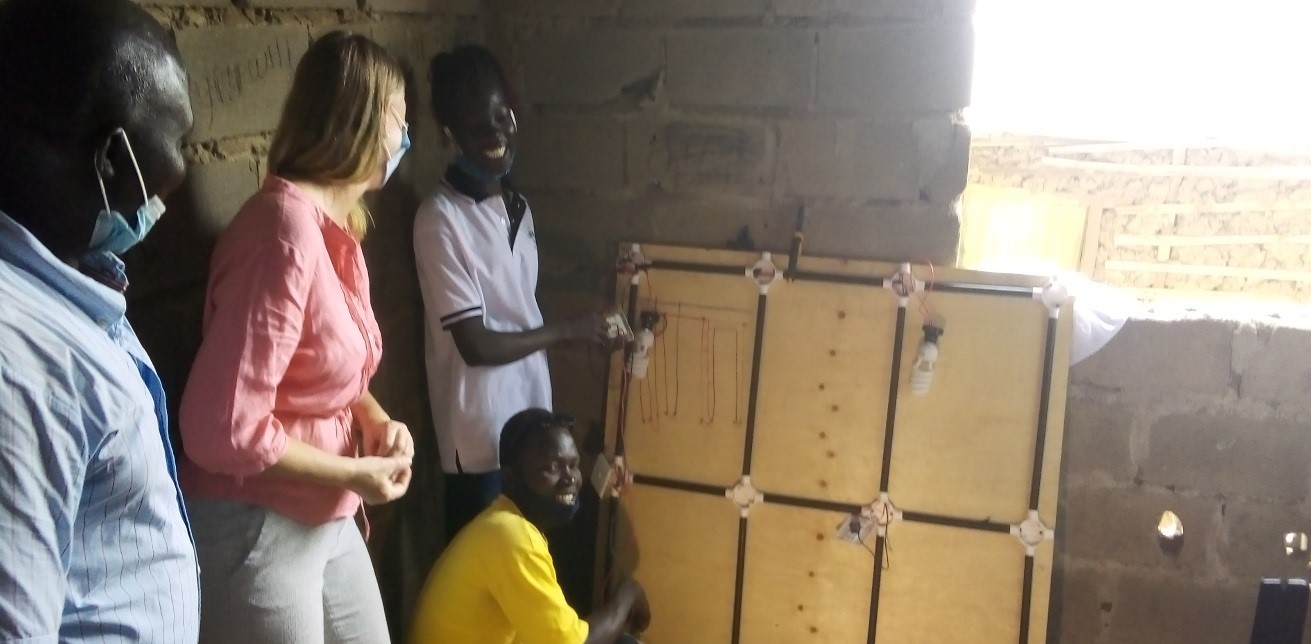In a dimly lit concrete classroom, 19 years old Rita Night attended her routine practical lesson on electrical engineering.
She is one of the 150 beneficiaries at the Norwegian funded Bonga Vocational Training Center which provides technical and life skills training to underprivileged young people in the area.
Several reports say young people constitute almost 72% of the population in South Sudan, yet they are the most unemployed.
Youth unemployment rate in South Sudan is said to be at 12%, an estimate that researchers attribute to high illiteracy rates brought about by a series of civil wars since the liberation struggle in the eighties and recent political violence in the country.
On Wednesday, the Norwegian Ambassador to South Sudan toured the four training centers to witness the impact that her country’s charitable funding has had on the beneficiaries.
Rita is the only girl in a male dominated class of 25 boys in the electrical engineering class.
She was diligently connecting the complex set of electrical appliances when the visiting delegation arrived.
Outside the makeshift class, a group of women sang to the ambassador as her convoy slowly squeezed into the small parking space.
Speaking to the ambassador, she proudly said she believes a woman can do what a man can do.
“I am very happy for these organizations for letting me know my rights and to know that all that men do, women can also do, as you can see out of 25 boys, I am the only lady. I am very happy, as now, I can even wire the whole room, which is a surprise for many women,” she said to a cheering crowd.
Breaking gender barriers in the patriarchal society of South Sudan is difficult. It’s even more difficult for a young teenage girl like Rita who might have defied societal scorns and prejudice to become who she wants to be.
However, Rita is not the only child with a compelling story. At the open field of the vocational school, dozens of young men were training on bricklaying, masonry and mechanics, their muscles budging.
In this still suburb of Lemon Gaba, former rival gang members and bad boys have turned colleagues and are forging a common future filled with hope and determination.
They are training on simple mechanics, electricity, tailoring, catering and masonry for four months.
Biith William, a former street boy and gang member is now one of the ambitious trainees at the center.
Unperturbed by the ceremonious crowd meeting the ambassador, he narrated his story to Eye Radio.
“Before I came to this, I was just a street boy doing nothing and smoking, but I no longer do that. I left a lot behind including joining groups and fighting with other groups, I have been involved in such but now I know and I can tell that my future is going to be better,” he said.
“A lot of young men are there and they are doing such things which are not good. Even some are killing themselves with pangas and all those things they can kill themselves with, but I think they can also change like me.”
Chogi John is also training to become a construction engineer. In his few words spoken with energy, he said he wants to develop South Sudan.
“We are youth of Lemon Gaba, we give thanks to SAADO organization for supporting us for building. We have begun practicing on the part of the building,” he said.
“We want to support our country because we have a lot of engineers from other countries; those people of Uganda came here to build. Why not us? We are ready to support our country, we can develop our country.”
For her part, the Norwegian Ambassador to South Sudan, Siv Kaspersen says her government will continue supporting technical and vocational training in South Sudan.
Kaspersen also appealed to young people to acquire technical skills in order to change their lives.
”I would like to give encouragement to young people who don’t have anything to do really to see this as a way for them to change their lives, I would like to encourage all the young people to look for these opportunities and to come and gain more skills,” Kaspersen said.
According to a report by Rift Valley Institute in June 2021, the majority of young people in South Sudan face enormous challenges in trying to survive and progress in their lives.

